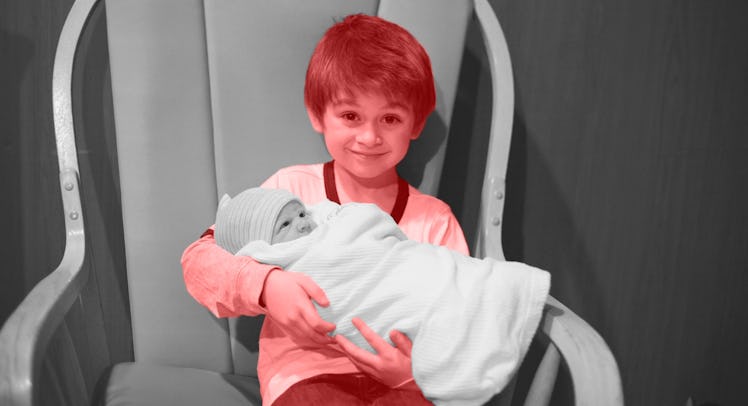How to Announce a New Baby to an Older Sibling
When it comes to parenting, sometimes it’s not about what you sell but how you sell it.

It’s important to be highly in tune with your existing child when you share the news of a new sibling. That’s because when a child goes from being an only child to being one of two or even one of several, the emotional possibilities can be pretty extreme. That’s why parents may need to consider multiple options when announcing a new baby.
In fact, it may help to have two plans going into the big reveal: One for an excited big brother or sister. And one for a grumpy, upset or confused child, says Alyson Schafer, a family counselor and the author of Honey I Wrecked the Kids. The third potential reaction, one of ambivalence, just doesn’t often last, she says.
“We must always take the attitude that it’s a positive thing,” she says. “The more we say it in a way of excitement, the better it is. You’re pitching it.”
Think Shark Tank, but higher stakes.
Parents also have to consider avoiding the creation of a rift if they have multiple kids already. “Kids need to be told at the same time in order to lessen sibling rivalry,” she says. “Gather everyone together. You don’t want to tell them one heard first.” No matter how parents feel, it’s critical they focus on their current kids and adapting to them. “God knows the infant isn’t going to know if anything exciting happened, so adapting to your existing children is far more important.”
If They’re Excited
Then go with it. Involve the child in decisions and help fuel the excitement of being a sibling, Schafer says.
How parents express that has to align with who they are as a person. Having some fun games to play along the way is great for a Pinterest Parent who likes to turn simple things into creative ventures, she says.
“You can have a lot of fun, but don’t force it,” she says. “You need to be authentically you. Kids can sense insincerity.”
Three Fun Ways for Kids to Track The Baby’s Arrival
- Count backwards on a wall calendar to the due date. Schafer says a calendar can help make the long pregnancy more tangible time-wise for a child as they see how long it takes to cross off each new day.
- Count out a Hershey’s kiss for each day of the pregnancy. Put them in a glass vase. Each day you can count down “to baby kisses.”
- Use the grocery store. When you go grocery shopping each week, find the item one of the pregnancy apps will reference for the size of the baby each week. Ask your child: “What’s the size of this chocolate chip?” Have them guess. “It’s the size of your baby brother or sister RIGHT NOW!”
If They’re Not Excited
Going from the only child to one of two can be really scary for a little one, Schafer says.
There’s no way to predict or alter that reaction beyond framing it well from the start. So if that’s the reaction, parents need to be sensitive to it. Reassurance is vital rather than trying to change a mindset.
“Depending on the attitude, you don’t want to make it out like a prince or a princess is coming,” she says. “If a child is already feeling threatened, then you don’t want to add to the stress.”
She suggests keeping things calm and simple. Reassure that life is going to be mostly the same. In other words, decorate the baby’s room, but don’t invite friends over to ooh and ahh, she says. At least not with the kid around.
“If you have a baby shower, consider getting a sitter,” she says. “Don’t include your child in situations that will further fears or feelings of resentment.”
Be Ready
Discussing a baby in mom’s belly can lead to an obvious question: How did it get in there? “It’s usually not the first question, but it may be a question that comes down the line,” Schafer says. Be ready to respond. Parents are more uncomfortable about it than kids.
Books can be a great help.
How Long Should Parents Wait?
Some parents are really excited to share the news, as evidenced by the number of peed-on pregnancy tests that show up on Instagram.
But when there is another child to think about, the advice to hold off on sharing good news is even more important.
“There are so many miscarriages in the first trimester,” Schafer says. “We don’t need to be making big announcements to siblings because then you’ll have to explain the loss of life.”
The one exception might be a particularly rough first trimester where a child is fearful of why mommy is spending so much time puking in bushes. Sharing the news and explaining facts may be necessary then, she says.
Whatever parents do, the existing child’s best interest should drive those decisions.
This article was originally published on